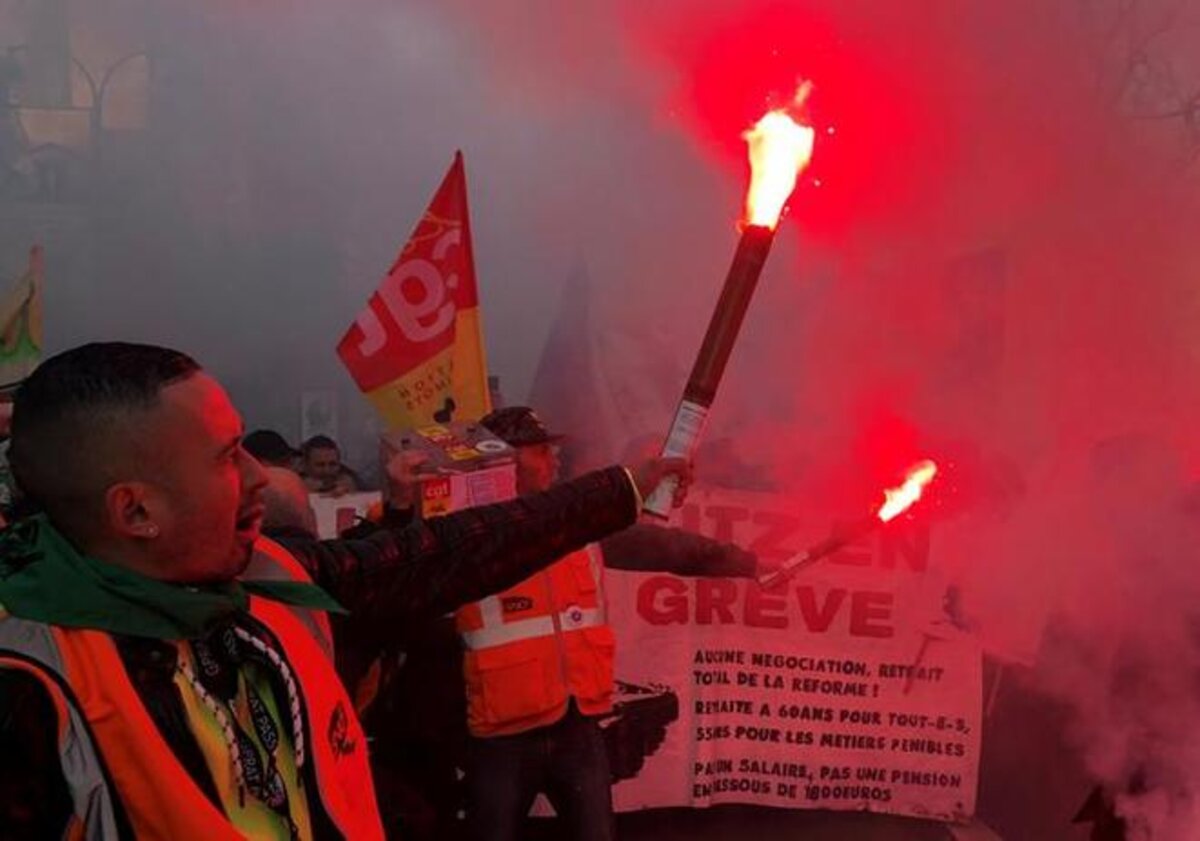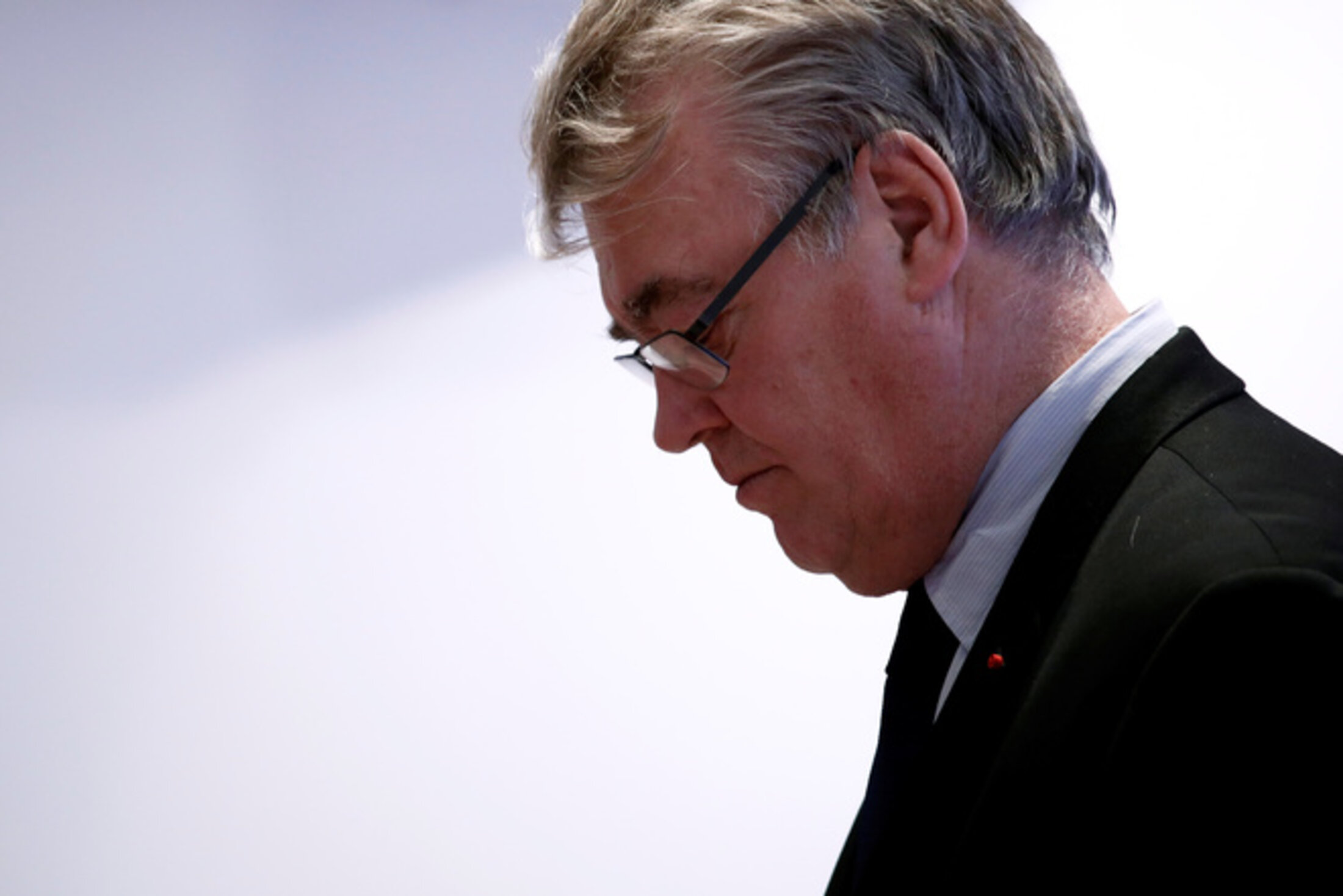Caught in spiralling revelations over his so-called “oversights” in failing to officially declare his many outside professional interests, the French government’s pension reforms tsar Jean-Paul Delevoye finally resigned his post of High Commissioner for Pensions on Monday, just as union-led opposition to the reforms enters a crucial week of further talks and protests, with another day of strikes and demonstrations held across the country on Tuesday.
Teachers, transport workers and hospital staff were among those, mostly public sector employees, who took part in a nationwide walkout and demonstrations today in opposition to President Emmanuel Macron’s proposed pension reforms which unions want withdrawn and renegotiated. An independent head count by Occurrence, an agency specialised in estimating demonstration turnout and commissioned by several media, including Mediapart, put the numbers who joined the main march in Paris (where the transport system has remained severely disrupted since the start of protest strikes on December 5th) at 70,000, while union officials claimed 350,000. Paris police, meanwhile, estimated a turnout of 76,000.
At a national level, the CGT union claimed a total turnout of 1.8 million in 260 demonstrations across French cities and towns, notably, and apart from Paris, held in Bordeaux, Brest, Caen, Lille, Lyon, Marseille, Montpellier, Nantes, Rennes and Toulouse. The French interior ministry put the nationwide figure at 615,000.

Enlargement : Illustration 1

The government’s position in the standoff suffered a significant blow with the resignation and fall into disgrace yesterday of Jean-Paul Delevoye, who had been appointed as architect of the reforms that are regarded as among the most important for Macron’s current five-year term in office.
The main pillar of the reforms is the abolition of the existing 42 separate retirement schemes and the introduction of a universal credit point system. This was officially confirmed in an announcement last Wednesday by Prime Minister Édouard Philippe, although the fundamentals were already known to unions, many of which began strike action on December 5th, notably setting off a continuing, rolling walkout of transport workers and also one-day stoppages by education staff – both sectors which are set to lose comparatively advantageous pension rights.
But Philippe also announced his government’s intention of raising by two years the minimum age for most people to receive pension rights, which is currently 62. That prompted one of France’s largest trades unions, the CFDT, which in fact supported the principle of the universal credit point system reform, to join the strike action, denouncing the raise of the retirement age as a “red line” that cannot be crossed.
The departure of Delevoye could hardly have come at a more inopportune moment for the government, which must now hurriedly find a replacement for him just as negotiations with unions are due to reopen on Wednesday, before the draft reforms are to be presented before the Council of State and pension fund institutions.

Enlargement : Illustration 2

Delevoye, 72, a former conservative Member of Parliament (MP), senator and mayor who served as a minister under the presidency of Jacques Chirac, jumped ship in 2017 to support Macron’s election campaign. He was appointed later that year as high commissioner for the pension reform plan, and was given junior minister status in September, as high commissioner for pensions, to steer the pension system reforms to their expected inclusion into legislation in February next year.
But this key ally for the French president was placed in an untenable situation at the weekend following mounting media revelations of his omissions in the mandatory declaration of outside activities and interests which members of government must declare to Fance’s “high authority for transparency in public life” (la Haute Autorité pour la transparence de la vie publique), the HATVP. The required declarations concern both current outside roles, and any others held over the last five years.
One of those outside posts he failed to register was his role as president of Parallaxe, a think tank run by a private education group, which earned him, on top of his ministerial salary, a net monthly sum of 5, 368 euros (which he has said he may pay back). The remuneration breached Article 23 of the French constitution that prohibits a member of government from exercising paid activities in the public or private sectors.
Delevoye initially declared just three outside professional activities. On Saturday, newspaper Le Monde detailed how he had omitted to declare ten other present and recent activities with outside organisations. Amid the increasing media revelations that began last week, including how he served as an administrator of Ifpass, the staff training institute of the insurance industry which has an obvious interest in the pension reforms, and also that he sat on the board of French railways operator, the SNCF, Delevoye subsequently rectified his declaration to include all 13.
Now Mediapart can reveal yet another of his activities which he failed to register. This was Delevoye’s membership up until 2017 of the consultative council of the London-based Brazzaville Foundation, a body which is in effect a propaganda arm for Denis Sassou-Nguesso, the strongman president of the Republic of the Congo.
Delevoye claimed that he gave all proper attention to his initial declarations regarding his personal wealth. “I admit that I did not give the same attention to my declaration of interests,” he told Le Monde, “no doubt because I had the feeling of not having conflicts of interest and because I was obsessed by my declaration of wealth.”
Right up until the announcement yesterday of Delevoye’s resignation, which, it was announced, Macron accepted “with regret”, he continued to receive outspoken support from Prime Minister Édouard Philippe and other members of government, who presented his omissions on the HATVP registry as oversights. “I think that Jean-Paul Delevoye’s sincerity is total,” Philippe told newspaper Le Parisien in a report published on Saturday. “When he had the certainty that something in his declaration wasn’t right, he both resigned from those [outside] mandates for which he was not remunerated, and pledged to immediately pay back the sums [from others] in question.”
Education minister Michel Blanquer also spoke at the weekend of Delevoye’s “total” sincerity, while government spokeswoman Sibeth Ndiaye even suggested that “if we know today that he received remunerations that he should not have received, it’s because he declared them”.
Then on Monday, Gilles Le Gendre, head of the parliamentary group of Macron’s ruling LREM party, announced his “sadness” over the “courageous decision” by Delevoye to resign, adding that “nothing and nobody will take away from him his having imagined and conceived the most just and protective reform in France since 1945”.
But on Tuesday the tone had markedly changed, when an unnamed spokesperson for the prime minister’s office was quoted by public broadcaster France Televisions as saying: “It was for him to inform us and to ask if he could accumulate private-public salaries. He didn’t do so. One cannot assume that people will cheat. We’re not the police.”
Mediapart can now reveal that Delevoye – who in October 2018 posted a message on Twitter announcing that “Every leader must be exemplary and no-one is above the law” – was, on top of the 13 posts he has declared holding currently or during the previous five years, also a member of the consultative council of the London-based Fondation Brazzaville, whose patron is Prince Michael of Kent, a first cousin of Queen Elizabeth, for a period of at least one year up until 2017. His position is declared in an online presentation of the foundation (in French here). A bulletin dated August 31st 2016 published on the foundation’s website, in French, reads: “Mr Jean-Paul Delevoye, former president of the [editor’s note, official French] economic, social and environmental council, former minister of [French] public services, state reform and town and country planning, former [French official] ombudsman, has joined the consultative council of the Brazzaville Foundation.”
“This foundation is a not-for-profit organisation dedicated to resolving conflicts, to preserving the environment and the conservation of nature. Based in London, the foundation is led by an administration council composed of Messres Jean-Yves Ollivier […] The Brazzaville Foundation currently works on the development of a cooperation project, notably environmental, between countries present in the Congo Basin.”
The foundation is in fact used as a propaganda arm for Denis Sassou-Nguesso, 76, the strongman president of the Republic of the Congo whose latest term in power dates since 1997. The foundation’s president, Jean-Yves Ollivier, is close to Sassou-Nguesso, and was one of the notable figures of what is nicknamed “la Françafrique” – the now decried corrupt political system of French influence and alliances with the despots in place in its former African colonies. Ollivier played a secret role, alongside Michel Roussin, as intermediary between former French president and conservative party leader Jacques Chirac and numerous African heads of state. Roussin, who has since become a close aide to French billionaire Vincent Bolloré, whose Bolloré Group has industrial interests in Africa as well as media holdings in France, is also on the foundation’s administration board, along with Cecilia Attias, the ex-wife of former French president Nicolas Sarkozy.
As to just what brought Jean-Paul Delevoye onto the management of the Brazzaville Foundation, an insight was offered in a report by Paris-based magazine on African affairs, Jeune Afrique, published on May 7th 2017 immediately after Emmanuel Macron’s election as French president. The report profiled what it called the “godfathers” who surrounded the successful 39-year-old candidate, and notably those with connections to the African continent. Jean-Paul Delevoye was one of them, about whom Jeune Afrique noted: “The former minister of Jacques Chirac is not only the all-powerful selector of candidates of [Macron’s political movement] En Marche ! [later renamed the LREM] for the forthcoming legislative elections. Since his time at the helm of the economic, social and environmental council, he has criss-crossed Africa. One year ago, he joined the Brazzaville Foundation, led, among others, by Jean-Yves Ollivier, a close relation of President Sassou-Nguesso.”
Questioned by Mediapart in early September, Delevoye said his association with the Brazzaville Foundation was brought about by his activities in “international mediation”, but that media reports of the close links between Jean-Yves Ollivier and the Republic of the Congo strongman president Denis Sassou-Nguesso led to his rapid resignation. “I only took part in one dinner and a meeting,” he told Mediapart. “I was alerted to the relations between the foundation with the Congo president, and I took my distance, not having enough assurances about the ethics of the foundation, although it is composed of very conscientious people. My time [there] was brief, doubt took the upper hand.”
It is now for the HATVP to decide whether the many outside posts held by Delevoye were in good faith or should be reported to the public prosecution services. However, the question is raised as to why it had not done so sooner. That question is all the more serious in that it was aware, before the recent media revelations, that he had violated Article 23 of the French constitution which prohibits a government minister from holding a remunerated activity outside of his post in government.
Just why it did not consider the case earlier remains to be explained, while its position on Delevoye’s failure to declare his many outside interests, and whether to refer the issue to public prosecutors, is due to be announced on Wednesday, the same day that the government is to meet union representatives on further negotiations over the pension system reforms.
-------------------------
- This is an abridged version, with added reporting, of two reports published by Mediapart in French which can be found here and here.
English version and added reporting by Graham Tearse


